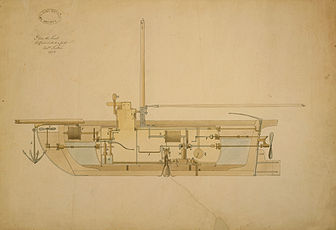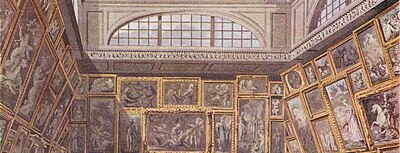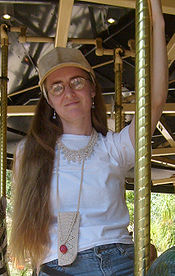| Revision as of 20:21, 2 July 2008 view sourceGiano II (talk | contribs)22,233 edits gr← Previous edit | Latest revision as of 07:54, 9 June 2024 view source JJMC89 bot III (talk | contribs)Bots, Administrators3,696,753 editsm Moving Category:Wikipedian Hyphen Luddites to Category:Wikipedian hyphen luddites per Misplaced Pages:Categories for discussion/Speedy | ||
| (349 intermediate revisions by 25 users not shown) | |||
| Line 1: | Line 1: | ||
| {{User:Durova/templates|pagetop}} | |||
| <br /><center><div style="text-align:center;width:60%;padding:1em;border:solid 2px gold;letter-spacing: 28px;background-color:black;color:white;font-weight:bold">RESTING</div></center><br /> | |||
| <div align="center"> | |||
| ] | |||
| <span style="display: inline;"><span style="display: table-cell; border: 5px solid #a86; box-shadow: 0.1em 0.1em 0.5em rgba(0,0,0,0.75); -moz-box-shadow: 0.1em 0.1em 0.5em rgba(0,0,0,0.75); -webkit-box-shadow: 0.1em 0.1em 0.5em rgba(0,0,0,0.75); border-radius: 0.5em; -moz-border-radius: 0.5em; -webkit-border-radius: 0.5em;">]</span></span> | |||
| </div> | |||
| <div align="center"> | |||
| <gallery widths="225px" heights="170px" perrow="3" caption="]" style="margin: .5em auto; border: 5px solid #a86; box-shadow: 0.1em 0.1em 0.5em rgba(0,0,0,0.75); -moz-box-shadow: 0.1em 0.1em 0.5em rgba(0,0,0,0.75); -webkit-box-shadow: 0.1em 0.1em 0.5em rgba(0,0,0,0.75); border-radius: 0.5em; -moz-border-radius: 0.5em; -webkit-border-radius: 0.5em;"> | |||
| File:Tropenmuseum Royal Tropical Institute Objectnumber 3444-7 Begrafenis bij plantageslaven2.jpg | |||
| File:French mutilé with mask2.jpg | |||
| File:French mutilé without mask2.jpg | |||
| </gallery> | |||
| </div> | |||
| Hi, my name is Lise Broer. Currently I have 412 featured credits: 318 at English Misplaced Pages and 94 at Wikimedia Commons. Most of that represents digital restoration of archival material. Due to curatorial practices and copyright laws, the best sources tend to be American. A group of people are working to gain more diverse access to high resolution files from museums, libraries, and other archives globally. Many thanks especially to the Open Progress Foundation, WMF Netherlands, and the Tropenmuseum of Amsterdam for opening greater media access to the history of Suriname and Indonesia. | |||
| Durova, many American citizens subsidised the terrorism in Northern Ireland for a great many years, until the 9/11 crisis made it too embarrassing for your government to allow it to continue. Perhaps you could include all victims or terrorism, worldwide, in your appeal for dignity. Thank you. ] (]) 20:16, 2 July 2008 (UTC) | |||
| <div style="float: right; margin-left: 1em;"> | |||
| <span style="display: inline;"><span style="display: table-cell; border: 5px solid #a86; box-shadow: 0.1em 0.1em 0.5em rgba(0,0,0,0.75); -moz-box-shadow: 0.1em 0.1em 0.5em rgba(0,0,0,0.75); -webkit-box-shadow: 0.1em 0.1em 0.5em rgba(0,0,0,0.75); border-radius: 0.5em; -moz-border-radius: 0.5em; -webkit-border-radius: 0.5em;">]</span></span> | |||
| </div> | |||
| Overall I've contributed featured material at 5 of Misplaced Pages's 6 featured content types and have gotten 68 articles to Misplaced Pages's main page at ]. A number of those involved creating and photographing examples of textile arts subjects such as ]. | |||
| As of 15 February 2010 my most significant contributions have been: | |||
| * 288 ]: 13.1% of Misplaced Pages's total 2,194 featured pictures | |||
| * 22 ]: 17.2% of Misplaced Pages's total 128 featured sounds | |||
| There's plenty of historic media out there waiting to add value to this website. Misplaced Pages would be better off if more people joined in this undertaking. If you'd like to participate either by opening doors or learning restoration, please leave word on user talk. | |||
| Have a browse through my content galleries: | |||
| * ] | |||
| * ] | |||
| * ] | |||
| * ] | |||
| * ] | |||
| One of the best things about media work is how readily it crosses international boundaries. One of my restorations was selected ] for the 2008 Commons Picture of the Year. And although I don't count other language projects toward my featured credit total, I happen to have 131 featured pictures on the Turkish Misplaced Pages--not all of which are featured here or on Commons. | |||
| *] | |||
| <hr style="clear: both;" /> | |||
| <div align="center"> | |||
| <gallery caption="Restoration on the ] yields a discovery" widths="225px" heights="162px" perrow="3" style="border: 5px solid #a86; box-shadow: 0.1em 0.1em 0.5em rgba(0,0,0,0.75); -moz-box-shadow: 0.1em 0.1em 0.5em rgba(0,0,0,0.75); -webkit-box-shadow: 0.1em 0.1em 0.5em rgba(0,0,0,0.75); border-radius: 0.5em; -moz-border-radius: 0.5em; -webkit-border-radius: 0.5em;"> | |||
| File:Wounded Knee aftermath.jpg|Unrestored version: mislabeled ''scattered debris of camp'' in Library of Congress bibliographic notes. | |||
| File:Wounded Knee aftermath3.jpg|Restored version: four human remains in foreground partially wrapped in blankets. | |||
| File:Wounded Knee aftermath3 detail.jpg|Detail from restored version: a face in profile, hand at right. | |||
| </gallery> | |||
| </div> | |||
| Library of Congress staff have updated the description. An excerpt of their reply follows: | |||
| : ''Upon viewing the high-res TIFF file we made of the file, the human remains are quite visible, indeed. Thank you very much for contacting us regarding this image, and for your interest in our collections. You can imagine that among a collection of 14 million items here, there are a lot of secrets waiting to be uncovered!'' | |||
| Subsequent to this restoration, the Montréal Museum of Fine Arts ran an exhibit of historic photography and incorporated the updated Library of Congress bibliographic data into the museum's official program notes. | |||
| ---- | |||
| <div align="center"> | |||
| <gallery caption="Other examples" widths="225px" heights="170px" perrow="3" style="border: 5px solid #a86; box-shadow: 0.1em 0.1em 0.5em rgba(0,0,0,0.75); -moz-box-shadow: 0.1em 0.1em 0.5em rgba(0,0,0,0.75); -webkit-box-shadow: 0.1em 0.1em 0.5em rgba(0,0,0,0.75); border-radius: 0.5em; -moz-border-radius: 0.5em; -webkit-border-radius: 0.5em;"> | |||
| File:Tropenmuseum Royal Tropical Institute Objectnumber 3444-7 Begrafenis bij plantageslaven2.jpg|In fall 2009 the ] of Amsterdam held an exhibit about the cultural history of Suriname in cooperation with the Dutch chapter of the Wikimedia Foundation. The show was national news in The Netherlands and received a visit from President ] of Suriname. | |||
| File:Dresden photochrom2.jpg|In March 2009 the German chapter of the Wikimedia Foundation announced that the University of ] had agreed to release a quarter million images to Wikimedia Commons. This restoration of prewar Dresden is a gesture of thanks for that generous donation. | |||
| File:Hotel Del c1900b.jpg|The ] is a National Historic Landmark in ]. This image by ] c.1900 was unknown to the hotel staff when it turned up, badly damaged, in Library of Congress archives. The restored version ran on Misplaced Pages's main page for the fiftieth anniversary of the film '']'', for which the hotel was the principal location. | |||
| </gallery> | |||
| </div> | |||
| ---- | |||
| '''What is digital restoration and why does it matter?''' | |||
| Featured picture restorations at Misplaced Pages usually start from an uncompressed TIFF file of 10 MB or larger. Typical projects use material in the 25 MB to 100 MB range. Work is performed at a minimum 200% resolution without automated settings or plug-ins. All edits are carefully documented. The labor time depends on the project, generally five to fifteen hours for a fast worker. | |||
| <div align="center"> | |||
| <gallery caption="An 1806 submarine design by ]" widths="375px" heights="230px" perrow="3" style="border: 5px solid #a86; box-shadow: 0.1em 0.1em 0.5em rgba(0,0,0,0.75); -moz-box-shadow: 0.1em 0.1em 0.5em rgba(0,0,0,0.75); -webkit-box-shadow: 0.1em 0.1em 0.5em rgba(0,0,0,0.75); border-radius: 0.5em; -moz-border-radius: 0.5em; -webkit-border-radius: 0.5em;"> | |||
| File:Fultondesign.jpg|Before restoration. | |||
| File:Fultondesign7.jpg|After restoration. | |||
| </gallery> | |||
| </div> | |||
| High quality digital restorations promote free culture. Online access to free media is not yet on par with access to free texts. Premium restorations of historic material provide an incentive for cultural institutions to digitize their collections and share with the public. Great media leads to great articles: viewers engage with media content and want to provide context--media turns readers into editors. | |||
| The free culture movement assists cultural preservation. Large museums and libraries contain millions of items, some of which lack full documentation. Curators and librarians welcome assistance from the public to improve their records, such as the discovery that the Wounded Knee Massacre image contained human remains. Also, digital sharing is a layer of protection to prevent physical damage to cultural institutions from resulting in total loss. The recent Haitian earthquake caused severe damage to most of the government buildings in Haiti's capital. Problems can occur anywhere: last year the regional archives of Cologne, Germany suffered irreparable losses when the archive building suddenly collapsed. That type of loss is minimized when high resolution digital copies remain in multiple locations. | |||
| We can't count on this situation to improve passively: currently no industry technical standard exists for digitizing media. Many institutions have traditionally depended upon income from reproduction sales to cover part of their operating budget. Win-win solutions exist. See the following links for more information. | |||
| *] | |||
| *] | |||
| * | |||
| ---- | |||
| '''Why the name Durova?''' | |||
| ] was the first female officer of the Russian army. She enlisted as a private during the Napoleonic Wars, was decorated in combat, and retired as a captain. More than two decades later she met ], who learned that she had kept a journal during her wartime service and encouraged her to publish her memoirs. In part because of her example, Russia and the USSR had the highest participation of female wartime combatants of any Allied nation during World War I and World War II. | |||
| </div> | |||
| {{User:Durova/templates|pagebottom}} | |||
| ] | |||
| ] | |||
Latest revision as of 07:54, 9 June 2024
Hi, my name is Lise Broer. Currently I have 412 featured credits: 318 at English Misplaced Pages and 94 at Wikimedia Commons. Most of that represents digital restoration of archival material. Due to curatorial practices and copyright laws, the best sources tend to be American. A group of people are working to gain more diverse access to high resolution files from museums, libraries, and other archives globally. Many thanks especially to the Open Progress Foundation, WMF Netherlands, and the Tropenmuseum of Amsterdam for opening greater media access to the history of Suriname and Indonesia.
Overall I've contributed featured material at 5 of Misplaced Pages's 6 featured content types and have gotten 68 articles to Misplaced Pages's main page at Template:Did you know. A number of those involved creating and photographing examples of textile arts subjects such as smocking.
As of 15 February 2010 my most significant contributions have been:
- 288 featured pictures: 13.1% of Misplaced Pages's total 2,194 featured pictures
- 22 featured sounds: 17.2% of Misplaced Pages's total 128 featured sounds
There's plenty of historic media out there waiting to add value to this website. Misplaced Pages would be better off if more people joined in this undertaking. If you'd like to participate either by opening doors or learning restoration, please leave word on user talk.
Have a browse through my content galleries:
- Featured picture credits on English Misplaced Pages
- Featured picture credits on Wikimedia Commons
- Featured sound credits on English Misplaced Pages
- Other featured content and good articles
- Articles listed at Template:Did you know
One of the best things about media work is how readily it crosses international boundaries. One of my restorations was selected third place overall for the 2008 Commons Picture of the Year. And although I don't count other language projects toward my featured credit total, I happen to have 131 featured pictures on the Turkish Misplaced Pages--not all of which are featured here or on Commons.
- Restoration on the Wounded Knee Massacre yields a discovery
-
 Unrestored version: mislabeled scattered debris of camp in Library of Congress bibliographic notes.
Unrestored version: mislabeled scattered debris of camp in Library of Congress bibliographic notes.
-
 Restored version: four human remains in foreground partially wrapped in blankets.
Restored version: four human remains in foreground partially wrapped in blankets.
-
 Detail from restored version: a face in profile, hand at right.
Detail from restored version: a face in profile, hand at right.
Library of Congress staff have updated the description. An excerpt of their reply follows:
- Upon viewing the high-res TIFF file we made of the file, the human remains are quite visible, indeed. Thank you very much for contacting us regarding this image, and for your interest in our collections. You can imagine that among a collection of 14 million items here, there are a lot of secrets waiting to be uncovered!
Subsequent to this restoration, the Montréal Museum of Fine Arts ran an exhibit of historic photography and incorporated the updated Library of Congress bibliographic data into the museum's official program notes.
- Other examples
-
 In fall 2009 the Tropenmuseum of Amsterdam held an exhibit about the cultural history of Suriname in cooperation with the Dutch chapter of the Wikimedia Foundation. The show was national news in The Netherlands and received a visit from President Ronald Venetiaan of Suriname.
In fall 2009 the Tropenmuseum of Amsterdam held an exhibit about the cultural history of Suriname in cooperation with the Dutch chapter of the Wikimedia Foundation. The show was national news in The Netherlands and received a visit from President Ronald Venetiaan of Suriname.
-
 In March 2009 the German chapter of the Wikimedia Foundation announced that the University of Dresden had agreed to release a quarter million images to Wikimedia Commons. This restoration of prewar Dresden is a gesture of thanks for that generous donation.
In March 2009 the German chapter of the Wikimedia Foundation announced that the University of Dresden had agreed to release a quarter million images to Wikimedia Commons. This restoration of prewar Dresden is a gesture of thanks for that generous donation.
-
 The Hotel del Coronado is a National Historic Landmark in Coronado, California. This image by William Henry Jackson c.1900 was unknown to the hotel staff when it turned up, badly damaged, in Library of Congress archives. The restored version ran on Misplaced Pages's main page for the fiftieth anniversary of the film Some Like it Hot, for which the hotel was the principal location.
The Hotel del Coronado is a National Historic Landmark in Coronado, California. This image by William Henry Jackson c.1900 was unknown to the hotel staff when it turned up, badly damaged, in Library of Congress archives. The restored version ran on Misplaced Pages's main page for the fiftieth anniversary of the film Some Like it Hot, for which the hotel was the principal location.
What is digital restoration and why does it matter?
Featured picture restorations at Misplaced Pages usually start from an uncompressed TIFF file of 10 MB or larger. Typical projects use material in the 25 MB to 100 MB range. Work is performed at a minimum 200% resolution without automated settings or plug-ins. All edits are carefully documented. The labor time depends on the project, generally five to fifteen hours for a fast worker.
- An 1806 submarine design by Robert Fulton
-
 Before restoration.
Before restoration.
-
 After restoration.
After restoration.
High quality digital restorations promote free culture. Online access to free media is not yet on par with access to free texts. Premium restorations of historic material provide an incentive for cultural institutions to digitize their collections and share with the public. Great media leads to great articles: viewers engage with media content and want to provide context--media turns readers into editors.
The free culture movement assists cultural preservation. Large museums and libraries contain millions of items, some of which lack full documentation. Curators and librarians welcome assistance from the public to improve their records, such as the discovery that the Wounded Knee Massacre image contained human remains. Also, digital sharing is a layer of protection to prevent physical damage to cultural institutions from resulting in total loss. The recent Haitian earthquake caused severe damage to most of the government buildings in Haiti's capital. Problems can occur anywhere: last year the regional archives of Cologne, Germany suffered irreparable losses when the archive building suddenly collapsed. That type of loss is minimized when high resolution digital copies remain in multiple locations.
We can't count on this situation to improve passively: currently no industry technical standard exists for digitizing media. Many institutions have traditionally depended upon income from reproduction sales to cover part of their operating budget. Win-win solutions exist. See the following links for more information.
- Misplaced Pages:Misplaced Pages Signpost/2009-07-13/Open letter
- Misplaced Pages:Misplaced Pages Signpost/2009-12-07/Editorial
- My blog
Why the name Durova?
Nadezhda Durova was the first female officer of the Russian army. She enlisted as a private during the Napoleonic Wars, was decorated in combat, and retired as a captain. More than two decades later she met Aleksandr Pushkin, who learned that she had kept a journal during her wartime service and encouraged her to publish her memoirs. In part because of her example, Russia and the USSR had the highest participation of female wartime combatants of any Allied nation during World War I and World War II.
Categories:


